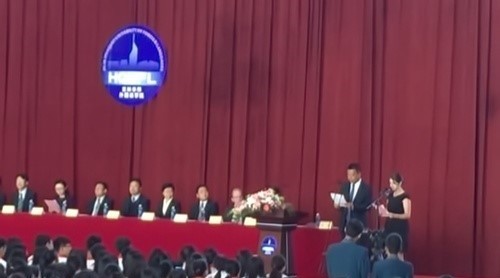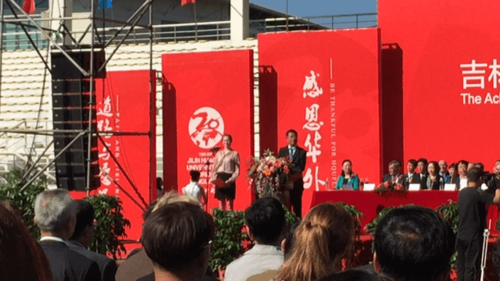Often the focus on China is directed to the mega-cities or more ethnically diverse parts of the country. Beijing, Shanghai, Shenzhen, Chengdu are all familiar to anyone who knows something about China. And yet there is much to learn from the lesser known areas as well. A new blog Connect Changping highlights two such lesser known places—Changchun and Siping both in Jilin Province—and gives us the opportunity to experience everyday China through the adventures of those who live and work there.
Specifically the good folks at Connect Changping hope “to bring people together who care about the cities of Changchun and Siping on a local and global level so that miraculous and often unheard stories of everyday life would be shared, resulting in greater empathy and humility as we learn about and live in these two cities.”
To whet your appetite, we are re-posting one of their early blogs about the ins and outs of hosting at a university event. After reading it be sure to click through to their site and connect with the people of Changchun and Siping.
Hosting 101
“Kelsey. Carrie. Are you free tomorrow afternoon? We need you to host an event,” Joanna asked.
“Hosting” is a bit of a vague term. Even though we didn’t fully know what “hosting” an event would entail, we felt up to the challenge. We knew it was a unique opportunity as native English speakers to serve our school on a practical level. There were three events that needed a host to speak in front of several thousand people during various ceremonies to kick off the school year. These events included Hua Qiao’s 20th anniversary, the freshmen welcome ceremony, and sports day.
We agreed and asked Joanna (our Foreign Affairs Officer) what she needed us to do. Joanna explained that our job would be to stand beside the Chinese host and read the translations of the welcome, order of ceremony and closing remarks. She invited us to come to the FAO office the next day to prepare and edit the speeches and scripts. We were also told that the University President invited us to her office to meet her, which was pretty exciting to us.
The next afternoon, we showed up to the office and spent about an hour drinking instant coffee and working with student volunteers to edit and practice our parts. After drilling the pinyin names and being encouraged to “sound more excited,” we felt comfortable to step into our roles.
As we continued to wait for our appointment with the President, we drank more instant coffee and played “Risk” on a cell phone . . . for two hours.
It was worth the wait. The president was kind and gracious as she welcomed us into her oval office. She thanked us for being a part of her community, not just as English teachers, but as important participants in her school vision. Sometimes, language and culture barriers separate us from the work of the rest of the faculty, so we were eager to be able to play a small part.
On the days of the events, our hosting job was to stand with the vice president and read the English translations of the introductions, commentary and closings of the ceremonies. Though it was a small role, it was important for the vision of being an international community, helping the foreign teachers and students feel included in the school events. As we stood on the stage at the events, staring at the faces of thousands of colleagues, students, and guests, we felt a sense of privilege to be a part of this school community and vision.

Carrie (above) and Kelsey (below) hosting for their university.

If you ever have the opportunity to host an event, here are some tips for success:
- If your event is outside, be sure to prepare for distractions: the sun in your eyes, the wind trying to steal your script and bees buzzing around your legs.
- It may be awkward when your co-host reads a long paragraph in Chinese and all you have for the English part is “Thank you.” People will laugh, but they are not laughing at you.
- It’s okay to edit and change the wording on the script if it does not sound natural to you. If you are reading a longer speech, it’s helpful to have someone who can read Chinese help you so you can change the wording to feel more natural without losing the meaning.
- If you mess up or read something wrong, your co-host will be gracious and act like it was supposed to be that way. Just try not to make a face and no one will know.
- The more energetic and happy you can sound, the more enjoyable it will be for the people. If you are having a hard time sounding excited, you can just speak an octave higher than you normally do.
“Hosting 101” was originally posted at Connect Changping on October 20, 2015. Used with permission.
Header image credit: Expressway distance by Brian Yap (葉) via Flickr.
Text images credit: Ryan Rains

Carrie Breum
Carrie Breum is originally from Lake Villa, Il. She graduated from Indiana Wesleyan University with a degree in TESOL. She moved to northeastern China in 2014 where she taught English and served as the editor of Connect Changping. View Full Bio
Kelsey
Kelsey has been a cross-cultural worker and teacher for over a decade.View Full Bio
Are you enjoying a cup of good coffee or fragrant tea while reading the latest ChinaSource post? Consider donating the cost of that “cuppa” to support our content so we can continue to serve you with the latest on Christianity in China.